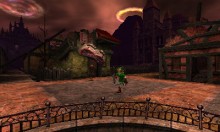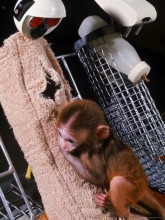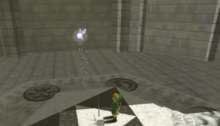Is the Hero of Time Happier in Majora’s Mask? Part One
Posted on January 27 2014 by Legacy Staff
 Very rarely do we take notice of the emotions of fictional characters within video games. While some games have an emphasis on emotion as a central theme, the Zelda games, especially in earlier installments, generally do not. Due to the subjective nature of emotions, it is difficult to determine what makes any particular person happy, sad, angry, etc. However, Link’s experiences in Majora’s Mask would seem to suggest that his time in Termina was more emotionally satisfying than his time spent in his native land of Hyrule. Hit the jump to read about Link’s strife in Hyrule in Part One!
Very rarely do we take notice of the emotions of fictional characters within video games. While some games have an emphasis on emotion as a central theme, the Zelda games, especially in earlier installments, generally do not. Due to the subjective nature of emotions, it is difficult to determine what makes any particular person happy, sad, angry, etc. However, Link’s experiences in Majora’s Mask would seem to suggest that his time in Termina was more emotionally satisfying than his time spent in his native land of Hyrule. Hit the jump to read about Link’s strife in Hyrule in Part One!
Anyone who has played through Ocarina of Time at least once can attest to the fact that Link has experienced more than his fair share of traumatic events. Before I get ahead of myself, however, it is important to start from the very beginning. In the opening hour or so of the game, Ocarina of Time establishes that Link is different from all the other Kokiri in the forest. Due to him not having a fairy, he is subjected to ridicule by the village’s leader, Mido, who calls him names like “Mr. No-Fairy,” and goes as far as to say that Link will never be accepted as a true Kokiri. While, the rest of the forest appears to embrace Link for who he is, especially Saria, who is by far Link’s closest and dearest friend, there is no doubt that Mido’s hateful words and actions cause psychological problems that resonate throughout the entire adventure for our young hero.
While I do not want this part of my editorial to be a public service announcement against bullying, it is important to note that due to Link’s young age, 10, he is a very impressionable human being whose still-developing brain can be easily scarred by emotional abuse. Recently, JAMA Psychiatry studied the effects of bullying on both victims and the bullies themselves from a psychological standpoint, and the results, though expected, were startling nonetheless. The study evaluated the mental health of victims and bullies from childhood into adulthood and found that victims had “higher levels of depressive disorders, anxiety disorders, generalized anxiety, panic disorder, and agoraphobia (fear of crowded places).” While it is impossible to tell whether Link displays these symptoms as a result of Mido’s constant bullying, it can most definitely be said that his mental health suffered from it in some way. It is most likely that the nature of Mido’s words caused a degree of depression and social isolation, as his words were aimed at Link’s identity and invalidation of being a Kokiri, although this will be covered in more detail later on. However, Link being bullied only scratches the surface of his emotional struggles.
 One of the most iconic elements of Ocarina of Time is the fact that Link can travel between his future and past at will by pulling the Master Sword from the Pedestal of Time and placing it back, respectively. Because he was not old enough or strong enough to wield the Master Sword, he was sealed away in the Sacred Realm, and Ganondorf was free to take control of and manipulate the country in any way he saw fit. When Link first leaves the Temple of Time, he immediately sees the aftermath of Ganondorf’s reign, as the once thriving Hyrule Castle Town is now dismantled and abandoned, only populated by ReDeads. Throughout Link’s subsequent travels, he finds what other terrible fates have befallen the various people of Hyrule due to his absence. Monsters have overrun his native village, the inhabitants of Goron City are being held prisoner to be fed to Volvagia, and Zora’s Domain has frozen over, encasing almost every Zora inside the ice. As Link sees what Gandondorf has done to these formerly peaceful provinces of Hyrule and remembers how they once were, his natural reaction is guilt, as the last seven years that he spent in a divine slumber could have instead prevented Ganondorf’s oncoming slaughter of innocent civilizations.
One of the most iconic elements of Ocarina of Time is the fact that Link can travel between his future and past at will by pulling the Master Sword from the Pedestal of Time and placing it back, respectively. Because he was not old enough or strong enough to wield the Master Sword, he was sealed away in the Sacred Realm, and Ganondorf was free to take control of and manipulate the country in any way he saw fit. When Link first leaves the Temple of Time, he immediately sees the aftermath of Ganondorf’s reign, as the once thriving Hyrule Castle Town is now dismantled and abandoned, only populated by ReDeads. Throughout Link’s subsequent travels, he finds what other terrible fates have befallen the various people of Hyrule due to his absence. Monsters have overrun his native village, the inhabitants of Goron City are being held prisoner to be fed to Volvagia, and Zora’s Domain has frozen over, encasing almost every Zora inside the ice. As Link sees what Gandondorf has done to these formerly peaceful provinces of Hyrule and remembers how they once were, his natural reaction is guilt, as the last seven years that he spent in a divine slumber could have instead prevented Ganondorf’s oncoming slaughter of innocent civilizations.
In no way do I claim to be a psychiatrist, and it is far out of my jurisdiction to diagnose anyone with a mental illness, but if I were, I would say that Link is a candidate for having the potential to suffer from survivor’s guilt, which was redefined in the Diagnostic and Statistical Manual of Mental Disorders (DSM) in 1994 as a symptom of posttraumatic stress disorder. Many of you may have already heard of posttraumatic stress disorder, or PTSD for short, as the illness that soldiers succumb to upon returning from war. Several factors play into a diagnosis of posttraumatic stress disorder, including exposure to trauma and childhood emotional abuse. As Link obviously lives a very trying life in Ocarina of Time, he is subjected to traumatic events almost on a daily basis. Being emotionally scarred as a child, his traversal through deadly dungeons, facing death regularly, and the condition of Hyrule in his adult life are all significant factors in possibly diagnosing Link with PTSD, although he is more likely to only have survivor’s guilt. Especially for a game released in 1998, it is extremely difficult to assess the mental health of certain characters. Since PTSD sufferers generally experience difficulty sleeping, nightmares, dissociation and isolation, avoidant responses, and emotional outbursts, Link cannot be categorized as a full-blown victim, but his survivor’s guilt, on the other hand, can be seen through his social interactions. Quite often, people suffering from survivor’s guilt will try to diminish their own remorse by helping others deal with their own problems (an issue that will be more heavily touched upon in Part Two). However, these people also tend to suffer from clinical depression. Unfortunately, the Hero of Time’s life also contains another facet that is sure to make him an absolute mess.
After Link defeats the spirit inside of the Forest Temple, he is teleported to the now-withered Great Deku Tree, where the heart attack-inducing introduction of the Deku Tree Sprout occurs. The sprout informs Link that because he was able to defeat Phantom Ganon and awaken Saria as a sage, it broke the curse that the spirit of the temple held over the forest that forbade new vegetation from growing. Now that the Deku Tree Sprout may grow and flourish, he is more than happy to deliver some devastating news to Link! As he explains that Link’s friends did not recognize him in his grown up body because the Kokiri never grow up, he tells Link that he was never a Kokiri at all, but rather a Hylian. The sprout goes on to explain how link ended up in the forest in the first place.
“Some time ago, before the King of Hyrule unified this country, there was a fierce war in our world. One day, to escape the fires of the war, a Hylian mother and her baby boy entered this forbidden forest. The mother was gravely injured… Her only choice was to entrust the child to the Great Deku Tree, the guardian spirit of the forest. The Deku Tree could sense that this was a child of destiny, whose fate would affect the entire world, so he took him into the forest. After the mother passed away, the baby was raised as a Kokiri.”
Link now knows that he had spent his life in a place where he truly did not belong, and that Mido was right to say that he would never be a true Kokiri, because he never was one. The Deku Tree Sprout’s words were really a bombshell for Link, who realizes that he is not truly a part of the people that he grew up with. Also, even though his mother was never present in his life, the fact that Link now knows about his mother at all can be very mentally taxing, especially considering the only family he thought he had no longer recognizes him as he is an adult, and now Link has no family at all. This is because people search for comfort and companionship, and often times yearn for it after periods of separation or stress, which is what Link lacks and most desperately desires, simply because it is hardwired into the human brain. Due to Link’s lack of any lasting intimate relationship, it is probable that he is experiencing social isolation, which psychologist Harry Harlow studied, alongside maternal dependency, through observing the cognitive development of infant rhesus monkeys in the middle 20th century.
 On separate occasions, Dr. Harry Harlow performed experiments on infant monkeys in order to observe the maternal bond and the effects of isolation on cognitive development. These experiments are very well known to this day, however are considered to be highly unethical by today’s standards. In his maternal bond study, Harlow would place the monkeys in a setting that had a “mother” made of wire that would provide nourishment and another “mother” made of cloth, which did not provide any sustenance. Harlow observed that the monkeys would almost always cling to the cloth “mother,” and only use the wire one in order to feed itself. While this study supported that mother-child interaction and love was important in growth, it did not show how the presence of the cloth “mother” affected the monkeys. Harlow then performed various “mother” experiments called “open-field” tests and “fear” tests. In the “open-field” test, the monkeys were placed in an area with several objects, and were observed in regards to the presence of the “mother.” When the “mother” was present, the monkeys would interact curiously and fearlessly with the objects, but when the “mother” was absent, they would curl up in fear, sucking their thumbs. Almost the same result came forth from the “fear” test, which usually put a frightening object in the area to scare the monkeys. With the “mother” present, and the fear-stimulus was applied, the monkeys would run and cling to the “mother,” then whenever they felt safe, they would interact with whatever was scaring them. Again, in the absence of the “mother,” the monkeys showed fear throughout, never gaining courage enough to uncurl from their frightened cocoons. Another series of experiments performed by Harlow observed the effects of social isolation on these monkeys, and these were even more startling.
On separate occasions, Dr. Harry Harlow performed experiments on infant monkeys in order to observe the maternal bond and the effects of isolation on cognitive development. These experiments are very well known to this day, however are considered to be highly unethical by today’s standards. In his maternal bond study, Harlow would place the monkeys in a setting that had a “mother” made of wire that would provide nourishment and another “mother” made of cloth, which did not provide any sustenance. Harlow observed that the monkeys would almost always cling to the cloth “mother,” and only use the wire one in order to feed itself. While this study supported that mother-child interaction and love was important in growth, it did not show how the presence of the cloth “mother” affected the monkeys. Harlow then performed various “mother” experiments called “open-field” tests and “fear” tests. In the “open-field” test, the monkeys were placed in an area with several objects, and were observed in regards to the presence of the “mother.” When the “mother” was present, the monkeys would interact curiously and fearlessly with the objects, but when the “mother” was absent, they would curl up in fear, sucking their thumbs. Almost the same result came forth from the “fear” test, which usually put a frightening object in the area to scare the monkeys. With the “mother” present, and the fear-stimulus was applied, the monkeys would run and cling to the “mother,” then whenever they felt safe, they would interact with whatever was scaring them. Again, in the absence of the “mother,” the monkeys showed fear throughout, never gaining courage enough to uncurl from their frightened cocoons. Another series of experiments performed by Harlow observed the effects of social isolation on these monkeys, and these were even more startling.
Harlow was on the hunt for the effects of partial and social isolation on the development of the brain, and again used his infant rhesus monkeys as his subjects. In partial isolation, the monkeys were left in wired cages, allowed to view the outside world and other monkeys in the immediate area. However, they were not given any physical contact whatsoever, and in some cases, were left partially isolated for years. The results of the partial isolation is quite shocking, really, as these monkeys were observed to have developed mental abnormalities, such as repetitive circling in their cages and self mutilation. In total isolation, the monkeys were cut off entirely from any contact with any other being for periods of three months, six months, 12 months, or 24 months. The results of these subjects are disturbing to say the least, as they showed terrible psychological damage.
“No monkey has died during isolation. When initially removed from total isolation, however, they usually go into a state of emotional shock, characterized by… self-clutching and rocking. One of the monkeys isolated for 3 months refused to eat after release and died 5 days later. The autopsy report attributed death to emotional anorexia… The effects of 6 months of total social isolation were so devastating and debilitating that we had assumed initially that 12 months of isolation would not produce any additional decrement. The assumption proved to be false; 12 months of isolation almost obliterated the animals socially…”
-Dr. Harry Harlow
Dr. Harlow’s experiments are important in discussing Link’s emotional struggles in Ocarina of Time, as they show how young animals, and as infants, humans are basically instinct driven animals, react to separation from their mothers, and from peers as well. Because Link’s separation from his mother occurred at such a young age, his biological need for companionship was never satisfied, and no one was ever truly able to fill the role of Link’s mother, except for maybe Saria. However, even Saria was not always there for Link as he faced near-death experiences every day from his adventures. Especially after Saria became the sage of the Forest Temple, Link had no one to turn to, no one to confide in, and became subjected to partial social isolation for the majority of his adult life. Social interactions were few and far between for Link, and as Harlow’s experiments showed, even short term partial isolation can lead to the development of psychological issues. His studies emphasized the importance of meaningful physical contact, something that no one could ever provide him. Even just a simple hug every now and again could have helped his mental health immensely.
 Alas, Link is alone, without a true family, without a mother, and all who he had a significant bond with became a sage and could only communicate with him in the Sacred Realm. He was a bullied child, who was mentally scarred at a young age. He witnessed the consequences of his seven-year sleep, and knew the whole time that he could have prevented it all. If he hadn’t picked up the sword, his biggest worry would simply be seeking Mido’s approval as a Kokiri. The worst part is, however, at the end of the game Zelda gives Link the opportunity to relive his childhood, regain the seven years that he lost, and have his guilt acquitted, but after he is sent to his own time, the only being that ever gave Link any company, Navi, leaves Link when he needs her most. His mental state has been shattered by the events that transpired within Ocarina of Time, and if only Navi had stayed, he could have picked up the pieces and started anew. Unfortunately, the loss of a “dear and beloved friend” is one of the most devastating moments in any person’s life, and a heartbroken and mentally unstable Link, who is severely depressed by all that has happened in his life thus far, must travel to Termina, in order to finish his journey, and maybe, just maybe, find true happiness.
Alas, Link is alone, without a true family, without a mother, and all who he had a significant bond with became a sage and could only communicate with him in the Sacred Realm. He was a bullied child, who was mentally scarred at a young age. He witnessed the consequences of his seven-year sleep, and knew the whole time that he could have prevented it all. If he hadn’t picked up the sword, his biggest worry would simply be seeking Mido’s approval as a Kokiri. The worst part is, however, at the end of the game Zelda gives Link the opportunity to relive his childhood, regain the seven years that he lost, and have his guilt acquitted, but after he is sent to his own time, the only being that ever gave Link any company, Navi, leaves Link when he needs her most. His mental state has been shattered by the events that transpired within Ocarina of Time, and if only Navi had stayed, he could have picked up the pieces and started anew. Unfortunately, the loss of a “dear and beloved friend” is one of the most devastating moments in any person’s life, and a heartbroken and mentally unstable Link, who is severely depressed by all that has happened in his life thus far, must travel to Termina, in order to finish his journey, and maybe, just maybe, find true happiness.
Sorry, but you’ll have to wait until next week to see what I have to say about Link’s mental state in Majora’s Mask, and how it actually improves in such a dark game! Spoiler alert, Link is not a masochist. Until then, leave comments down below!



